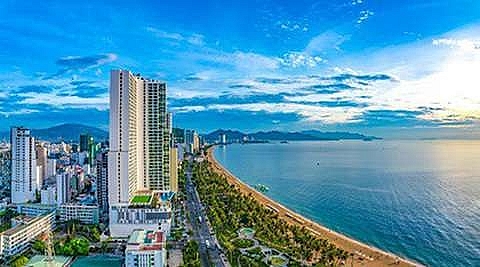Investment to focus on localities outside the big cities
 |
| A view of Nha Trang City in Khanh Hoa Province. - Photo cafef.vn |
“Land segments saw a high number of transactions in the first three months of the year, followed by apartments and industrial property,” said Vo Tri Thanh, former deputy head of the Central Institute for Economic Management.
Thanh noted that Hanoi, HCM City and Da Nang are not the only investment hotspots for investors. Quang Ninh, Khanh Hoa, Binh Thuan and Vung Tau are also receiving significant attention.
Some reports at the conference showed that in the first quarter of the year, the real estate sector took second position in attracting FDI among 18 industries.
A report from the General Statistics Office showed that the property sector posted a 4.75 per cent year-on-year increase. The real estate market has seen favourable developments, but faces challenges in planning policies, legal regulations, capital resources and land funds.
Nguyen Manh Khoi, deputy head of the Housing Management and Real Estate Department under the Ministry of Construction said the first quarter of the year was often quiet in the real estate market compared to other quarters, as there was a month falling within the Tet (Lunar New Year) Holiday.
Dang Van Quang, JLL director in Hanoi, said the Trump-Kim Summit in the first quarter of the year helped the real estate sector by promoting the countrys image. The industrial real estate sector also had opportunities to attract more investors thanks to the event.
However, Quang said HCM Citys property market was more quiet in the first quarter as many projects were still waiting for approval.
Nguyen Van Dinh, vice chairman of Viet Nam Association of Real Estate brokers said in the January-March period, the number of successful transactions was not high in two big cities. In Hanoi, there were 3,200 successful transactions out of 5,206 new property products offered for sale in the market. The number was much lower than that of the previous quarter. There were 3,000 successful transactions out of 3,274 new products in HCM City.
Dinh added that real estate projects in HCM City eligible for sale were few due to legal difficulties despite sufficient supply.
Talking about the property sector in the second quarter, 47 per cent among 200 attendees at the event said they would invest in property, followed by bank deposits, stocks and gold.
Up to 64 per cent of attendees believed that the property market would see a slight increase in the second quarter of the year, 15 per cent expected significant growth and 12 per cent forecast a reduction.
The apartment segment was expected to lead the market in the second quarter. It was followed by land, resort property, villa, terraced house, industrial estate and office for lease.
Prof Dang Hung Vo said there would not be a boom in the second quarter. This could happen in the third and fourth quarters of the year.
Nguyen Huu Quang, deputy general director of Netland Company said foreign investors had paid a lot of attention to Viet Nams resort property. There were investment waves from South Korea, Japan and Hong Kong into Viet Nam.
“We worked with partners from Hong Kong who are very interested in Viet Nams resort property market. Last week, I had a meeting with Japanese partners. It is expected there will be big investment from individual Japanese investors. Estate firms should offer suitable products to attract Japanese investors,” he added.
What the stars mean:
★ Poor ★ ★ Promising ★★★ Good ★★★★ Very good ★★★★★ Exceptional
 Tag:
Tag:
Related Contents
Latest News
More News
- An Phat 5 Industrial Park targets ESG-driven investors in Hai Phong (January 26, 2026 | 08:30)
- Decree opens incentives for green urban development (January 24, 2026 | 11:18)
- Public investment is reshaping real estate’s role in Vietnam (January 21, 2026 | 10:04)
- Ho Chi Minh City seeks investor to revive Binh Quoi–Thanh Da project (January 19, 2026 | 11:58)
- Sun Group launches construction of Rach Chiec sports complex (January 16, 2026 | 16:17)
- CEO Group breaks ground on first industrial park in Haiphong Free Trade Zone (January 15, 2026 | 15:47)
- BRIGHTPARK Entertainment Complex opens in Ninh Binh (January 12, 2026 | 14:27)
- Ho Chi Minh City's industrial parks top $5.3 billion investment in 2025 (January 06, 2026 | 08:38)
- Why Vietnam must build a global strategy for its construction industry (December 31, 2025 | 18:57)
- Housing operations must be effective (December 29, 2025 | 10:00)




















 Mobile Version
Mobile Version